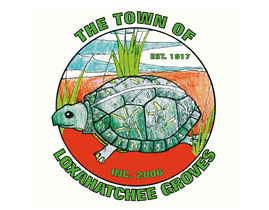The Loxahatchee Groves Town Council expressed general disinterest Tuesday in a proposal by Equine Eco Green for a public-private partnership to recycle horse bedding on property in the town. Council members felt that Wellington might be a better location for such a project.
Shelly Townsend, founder of Equine Eco Green, proposed a partnership that she believes would reduce the town’s concerns about horse bedding and manure, as well as water quality, and create revenue for Loxahatchee Groves.
“We would like to be your solution,” Townsend said, explaining that her company offers a patented, environmentally friendly recycling process for equine waste.
“We’re not looking for any funding,” she added, noting that the company is seeking state funding to underwrite its project.
Townsend said the process separates shavings and manure. The shavings are then processed by a method that washes, rinses, bleaches and dechlorinates them. The manure is composted, and the effluents are remediated so there is no discharge, she explained.
The shavings produced from the process are safer and cleaner for horses and small animals, because they are phenol-free, making them less allergenic, and with reduced dust that can cause respiratory problems.
“What we are mostly looking for is a nice location so that we can take care of this for you,” Townsend said. “Not only can we do the current problem, we can also restore the material from the areas that have been dumped on and clean up the pollution.”
Equine Eco Green holds a patent for the process good through 2031.
“We came to you to ask if you have any land to be allocated,” Townsend said. “We’d really love to help. We want to come in and clean up the area, not just haul it. We want to clean it up and produce a product that can be reused and recycled.”
Councilman Tom Goltzené said he thought the proposal was premature. “We don’t have any land,” he said.
Mayor Dave Browning added that Loxahatchee Groves is primarily residential, although it does have agricultural and equine activities.
Townsend agreed that the processing plant would not be appropriate for residential areas, and asked if there were commercial areas where it might be appropriate. “We really don’t want to be in an area where people live,” she said.
Browning said that except for portions of Southern Blvd., the town is primarily five-acre and 10-acre home sites.
Townsend asked about properties where equine refuse is being dumped, explaining that her company could clean it up, and Browning said those sites are illegal.
Councilman Jim Rockett said he likes the idea of cleaning up properties that have become dumping sites. “The location is difficult,” he said. “First of all, as Tom mentioned, we have no land to give you, or even lease it to you for a dollar a year.”
Rockett was also concerned about odor from the process. Townsend said her process is completely enclosed, pointing out that the dumping sites already pose odor and water pollution issues.
Goltzené said he did not see the proposal being popular with residents. “If you had some sort of educational process to go through, if you had a site, it would be better,” he said. “Because right now, everyone is imagining it right next to their house.”
Goltzené said residents are concerned about trucks coming through town. “Southern Blvd., as much as I hate the location, is the only feasible spot,” he said. “The property is more expensive there. I don’t know if you want to compete with a bank or a gas station when you’re trying to buy 10 acres of land.”
He added that the town would be unlikely to approve a process that would use water pulled out of the ground, and the only alternative would be Southern Blvd., which has ready access to a county water line.
Goltzené added that Wellington is the primary source of the town’s equine waste issues.
“We don’t feel a moral obligation to solve their problem,” he said. “We’re trying to stop what they’re doing to us right now, which is dumping their problem on us.”
Vice Mayor Ron Jarriel said Wellington has spent more than $100,000 on research to try to solve the problem, but their main concern is how much money they could make from recycling.
Jarriel said he had researched the process and was convinced it would not produce foul odors, would be self-contained and low-profile, and said some of the larger farm sites might be an appropriate location.
Jarriel said the town is interested in making revenue and asked about possible tipping fees.
“I believe if we could honestly solve a problem where we could control this and make money off of it at the same time, I personally think it would be a very wise decision,” Jarriel said.
Townsend said the process could probably also qualify for carbon credits, since the process recycles and reduces truck miles. She also pointed out that she has the endorsements of several experts, including Loxahatchee Groves resident Dr. Bill Louda, a scientist with the environmental sciences program at Florida Atlantic University.
Townsend added that she has discussed her ideas with Wellington.
During public comment, Loxahatchee Groves Water Control District Supervisor John Ryan said he had read through Townsend’s material and believes it to be an industrial-scale process rather than agricultural, and would require large amounts of manure to be cost-effective.
Ryan added that he thought that Townsend’s best bet would be to catch the attention of Wellington’s large equestrian interests, such as show jumping and polo stakeholders. “If they could find 10 acres, I think that that is where this kind of a project belongs,” he said.








